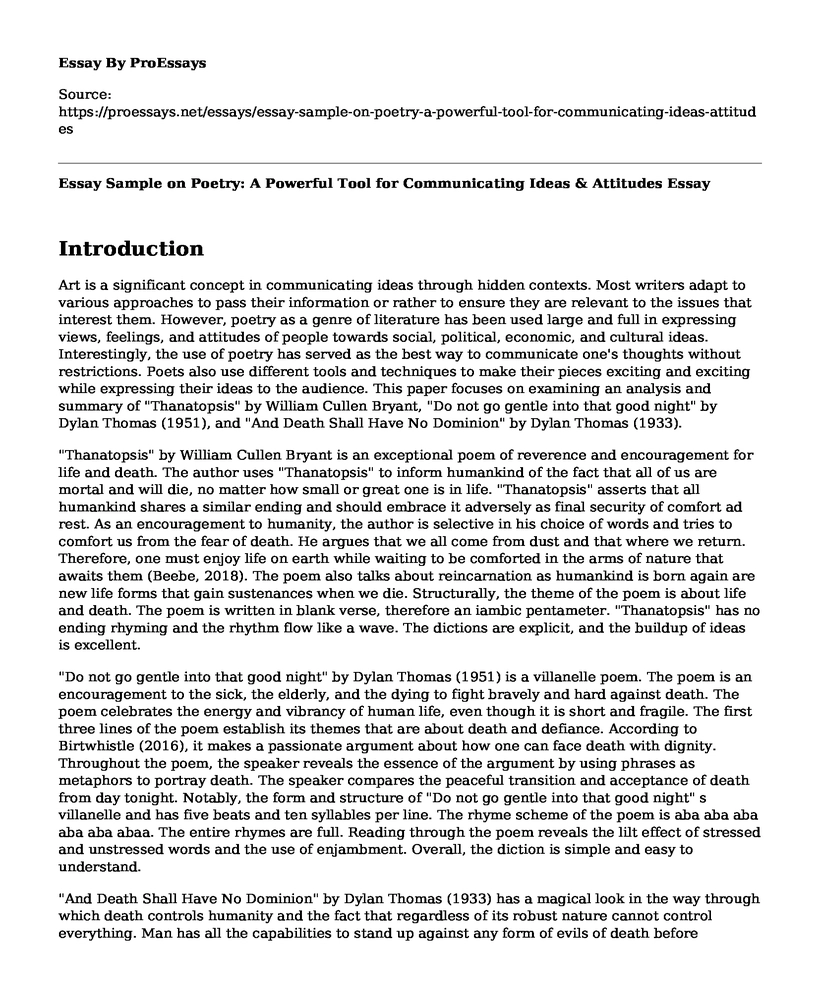Introduction
Art is a significant concept in communicating ideas through hidden contexts. Most writers adapt to various approaches to pass their information or rather to ensure they are relevant to the issues that interest them. However, poetry as a genre of literature has been used large and full in expressing views, feelings, and attitudes of people towards social, political, economic, and cultural ideas. Interestingly, the use of poetry has served as the best way to communicate one's thoughts without restrictions. Poets also use different tools and techniques to make their pieces exciting and exciting while expressing their ideas to the audience. This paper focuses on examining an analysis and summary of "Thanatopsis" by William Cullen Bryant, "Do not go gentle into that good night" by Dylan Thomas (1951), and "And Death Shall Have No Dominion" by Dylan Thomas (1933).
"Thanatopsis" by William Cullen Bryant is an exceptional poem of reverence and encouragement for life and death. The author uses "Thanatopsis" to inform humankind of the fact that all of us are mortal and will die, no matter how small or great one is in life. "Thanatopsis" asserts that all humankind shares a similar ending and should embrace it adversely as final security of comfort ad rest. As an encouragement to humanity, the author is selective in his choice of words and tries to comfort us from the fear of death. He argues that we all come from dust and that where we return. Therefore, one must enjoy life on earth while waiting to be comforted in the arms of nature that awaits them (Beebe, 2018). The poem also talks about reincarnation as humankind is born again are new life forms that gain sustenances when we die. Structurally, the theme of the poem is about life and death. The poem is written in blank verse, therefore an iambic pentameter. "Thanatopsis" has no ending rhyming and the rhythm flow like a wave. The dictions are explicit, and the buildup of ideas is excellent.
"Do not go gentle into that good night" by Dylan Thomas (1951) is a villanelle poem. The poem is an encouragement to the sick, the elderly, and the dying to fight bravely and hard against death. The poem celebrates the energy and vibrancy of human life, even though it is short and fragile. The first three lines of the poem establish its themes that are about death and defiance. According to Birtwhistle (2016), it makes a passionate argument about how one can face death with dignity. Throughout the poem, the speaker reveals the essence of the argument by using phrases as metaphors to portray death. The speaker compares the peaceful transition and acceptance of death from day tonight. Notably, the form and structure of "Do not go gentle into that good night" s villanelle and has five beats and ten syllables per line. The rhyme scheme of the poem is aba aba aba aba aba abaa. The entire rhymes are full. Reading through the poem reveals the lilt effect of stressed and unstressed words and the use of enjambment. Overall, the diction is simple and easy to understand.
"And Death Shall Have No Dominion" by Dylan Thomas (1933) has a magical look in the way through which death controls humanity and the fact that regardless of its robust nature cannot control everything. Man has all the capabilities to stand up against any form of evils of death before becoming unified in their move to the next world (Thomas, 2017). In the second of the poem, the author focuses on strong and brave men standing up against the odds and power of death and not willing to provide a break-even through the destruction of good things and torture. The repetition of the title in the first line makes the piece enticing, and the choice of language throughout the developmental stages makes the entire piece interesting. The central theme of the poem is death. The authors reveal the exposure that humanity is faced with in front of death. Structurally, the poem is a form of three nine-line stanzas with a sprung rhythm. All the lines start and end with the title line. The poem is entirely built on repetition.
References
Beebe, A. (2018). "Only Surpassed by the Light of Revelation": Asher Brown Durand's Thanatopsis. Religion and the Arts, 22(1-2), 79-94.
Birtwhistle, J. (2016). Do Not Go Gentle into That Good Night. BMJ supportive & palliative care, 6(3), 381-382.
Thomas, D. (2017). The Poems of Dylan Thomas. New Directions Publishing.
Cite this page
Essay Sample on Poetry: A Powerful Tool for Communicating Ideas & Attitudes. (2023, Apr 10). Retrieved from https://proessays.net/essays/essay-sample-on-poetry-a-powerful-tool-for-communicating-ideas-attitudes
If you are the original author of this essay and no longer wish to have it published on the ProEssays website, please click below to request its removal:
- Jazz Literature: The Case of "Sonny's Blues" by James Baldwin
- Is Macbeth a Tragic Hero or a Villain?
- "Winter Dreams" Fitzgerald Essay Example
- Assignment Example on Death of a Salesman by Arthur Miller
- Essay Sample on Aime Cesaire's A Tempest: Early Adaptation of Shakespeare's Work
- Essay Example on Aesir-Vanir War: Ancient Conflict of Norse Deities
- "Fathers & Sons: The Legacy of William Shakespeare" - Essay Sample







